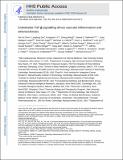Endothelial TGF-β signalling drives vascular inflammation and atherosclerosis
Author(s)
Chen, Pei-Yu; Qin, Lingfeng; Li, Guangxin; Wang, Zheng; Dahlman, James E; Malagon-Lopez, Jose; Gujja, Sharvari; Cilfone, Nicholas A; Kauffman, Kevin J; Sun, Lele; Sun, Hongye; Zhang, Xinbo; Aryal, Binod; Canfran-Duque, Alberto; Liu, Rebecca; Kusters, Pascal; Sehgal, Alfica; Jiao, Yang; Anderson, Daniel G; Gulcher, Jeffrey; Fernandez-Hernando, Carlos; Lutgens, Esther; Schwartz, Martin A; Pober, Jordan S; Chittenden, Thomas W; Tellides, George; Simons, Michael; ... Show more Show less
DownloadAccepted version (4.088Mb)
Publisher Policy
Publisher Policy
Article is made available in accordance with the publisher's policy and may be subject to US copyright law. Please refer to the publisher's site for terms of use.
Terms of use
Metadata
Show full item recordAbstract
© 2019, The Author(s), under exclusive licence to Springer Nature Limited. Atherosclerosis is a progressive vascular disease triggered by interplay between abnormal shear stress and endothelial lipid retention. A combination of these and, potentially, other factors leads to a chronic inflammatory response in the vessel wall, which is thought to be responsible for disease progression characterized by a buildup of atherosclerotic plaques. Yet molecular events responsible for maintenance of plaque inflammation and plaque growth have not been fully defined. Here we show that endothelial transforming growh factor β (TGF-β) signalling is one of the primary drivers of atherosclerosis-associated vascular inflammation. Inhibition of endothelial TGF-β signalling in hyperlipidemic mice reduces vessel wall inflammation and vascular permeability and leads to arrest of disease progression and regression of established lesions. These proinflammatory effects of endothelial TGF-β signalling are in stark contrast with its effects in other cell types and identify it as an important driver of atherosclerotic plaque growth and show the potential of cell-type-specific therapeutic intervention aimed at control of this disease.
Date issued
2019Department
Harvard University--MIT Division of Health Sciences and Technology; Koch Institute for Integrative Cancer Research at MIT; Massachusetts Institute of Technology. Institute for Medical Engineering & Science; Massachusetts Institute of Technology. Department of Chemical EngineeringJournal
Nature Metabolism
Publisher
Springer Science and Business Media LLC